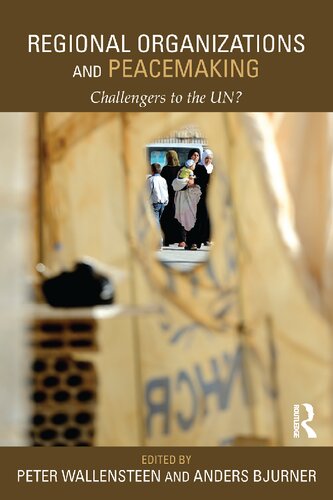

Most ebook files are in PDF format, so you can easily read them using various software such as Foxit Reader or directly on the Google Chrome browser.
Some ebook files are released by publishers in other formats such as .awz, .mobi, .epub, .fb2, etc. You may need to install specific software to read these formats on mobile/PC, such as Calibre.
Please read the tutorial at this link: https://ebookbell.com/faq
We offer FREE conversion to the popular formats you request; however, this may take some time. Therefore, right after payment, please email us, and we will try to provide the service as quickly as possible.
For some exceptional file formats or broken links (if any), please refrain from opening any disputes. Instead, email us first, and we will try to assist within a maximum of 6 hours.
EbookBell Team

0.0
0 reviewsThis book analyses the new and difficult roles of regional organizations in peacemaking after the end of the Cold War and how they relate to the United Nations (UN).
Regional organizations have taken an increasingly prominent role in international efforts to deal with international security. The book highlights the complex interaction between the regional and sub-regional organizations, on the one hand, and their relations with the United Nations, on the other. Thus, the general issues of UN and its authority are scrutinized from legal, practical and geopolitical perspectives. Taking on a broad geographical focus on Africa, the Arab world and Europe, the book also provides an extensive range of case studies, with detailed analysis of particular situations, organizations and armed conflicts.
The authors scrutinise the heterogeneous relationship between the different organizations as well as the challenges to them: political resources, legal standing, financial assets, capabilities and organizational set up. Moreover, they investigate whether regional organizations, as compared to the UN, are better suited to deal with today’s intra-state conflicts. The book also aims to dissect the evolution of these institutions historically – in relation to Chapter VIII of the UN Charter which mentions the resort to 'regional arrangements’ for conflict management – as well as more generally in relation to the principles of international law and UN principles of peacemaking.
This book, written by a mixture of established scholars, diplomats and high-level policymakers, will be of great interest to students as well as practitioners in the field of peace and conflict studies, regional security, international organisations, conflict management and IR in general.